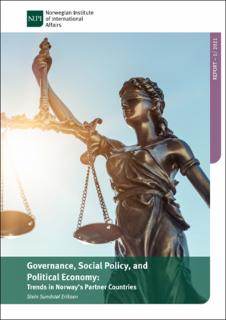Governance, Social Policy, and Political Economy: Trends in Norway’s Partner Countries
Research report
Published version
Permanent lenke
https://hdl.handle.net/11250/2738180Utgivelsesdato
2021Metadata
Vis full innførselSamlinger
- NUPI Report [195]
- Publikasjoner fra Cristin - NUPI [1426]
Sammendrag
In 2017–2018, NUPI (the Norwegian Institute of International Affairs) headed a project where political economy analyses were undertaken in eleven of Norway’s partner countries. These analyses were published as eleven separate reports. The reports focused on power relations and political developments in the partner countries, but they also analyzed the nature of governance. After the publication of the World Bank’s Worldwide Governance Indicators for 2019, the MFA approached NUPI and requested that we summarize the findings of this report for Norway’s eleven partner countries and assess these findings in light of the political economy analyses. We were also asked to investigate whether there were any connections between the nature and quality of governance on the one hand, and the nature of social policies and the human rights situation on the other. This report presents the findings of this assessment of the governance scores in the light of the above-mentioned political economy analyses. The report is structured as follows: Firstly, after briefly describing the governance indictors used by the World Bank, we summarize the eleven countries’ scores on the various governance indicators. Secondly, we assess the evolution of governance in the eleven countries, by comparing the scores in the 2019 report with those from 2011. Thirdly, we summarize the findings of the political economy analyses of the eleven countries and discuss how they fit with the governance scores. Finally, we present the eleven countries’ expenditure on social policies, as reported in the ILOs World Social Protection Report, and the human rights situation for the partner countries, and then describe how these findings relate to the governance scores.

